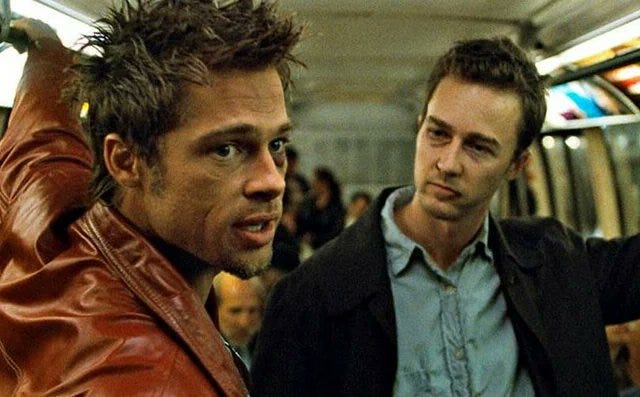That Thing We're Not Supposed to Talk About...
Just going to archive this here...
I watched Fight Club tonight. I saw it with my older son.
I figured he could handle it, and he did. In fact he loved it. He was blown away by it.
I first saw it in the year 2000—when I was in my early 20s—and it blew my away too. I’d never seen anything like it. It was one of the movies that that molded me—that changed me. It put me on a different path.
At the time I was thinking about going back to school. I’d tried college but it didn’t work out. So I was working crappy jobs and just floating.
Everyone told me I HAD to go to college to be something—to "make" something of myself. So i was considering going back. Maybe try to go to law school, or get an MBA, or some other corporate wage slave jawb.
But I didn’t do that. Instead I forged my own path. And I think that movie had something to do with it.
It’s funny how well Fight Club has held up. If it wasn’t for the lack of smart phones and flat screen TVs, you’d think it was set in 2025.
It’s a reminder of how stuck we’ve been. About how culture froze after 9/11.
Now, the culture didn’t just freeze in place. It slowly ground to a halt. Like an old diesel sputtering and kicking until it’s finally off.
But things haven’t changed that much since Fight Club. The fashion, the hair, the music—it’s not that different from what it was in 1999.
But we’re living in extraordinary times. And I'm hopeful culture (and history) will start moving again...
JD Vance gave a speech at the Munich Security Conference. It was a great speech—you should watch the entire thing.
Vance said "Contrary to what you might hear, a couple of mountains over in Davos, the citizens of all of our nations don’t generally think of themselves as educated animals or as interchangeable cogs of a global economy. And it’s hardly surprising that they don’t want to be shuffled about or relentlessly ignored by their leaders.”
I've never heard a politician talk like that before. But it was eerie--like I'd somehow heard it before.
I think it was because it sounded like something Tyler Durden would say. Like one of his monologues about our hollow globalized consumer society. A society where “citizens” aren’t called citizens—instead they’re called “consumers” by their so-called leaders. Where we need to mindlessly by schlock like the Edward Norton’s character (the Narrator) buys Ikea furniture.
Durden says things like, “We’re consumers. We are bi-products of a lifestyle obsession. Murder, crime, poverty, these things don’t concern me. What concerns me are celebrity magazines, television with 500 channels, some guy’s name on my underwear.”
Or my favorite quote, "You're not your job. You're not how much money you have in the bank. You're not the car you drive. You're not the contents of your wallet. You're not your fucking khakis."
In the movie, the Narrator invents Tyler Durden to save him from his soul sucking corporate job and the loneliness of his consumer lifestyle. Tyler gets him unstuck. Then Tyler sets out to blow up the system and free the rest of humanity through Project Mayhem.
Just like the Narrator created Tyler Durden, we invented Donald Trump. We needed something to save us from the corrupt globalist consumer machine. We needed something to get us unstuck—to get us moving. He’s out flashy alter ego, and we’re just the unreliable narrator that’s so stuck we can’t see our way out. And he’s the expression of our anger.
As Tyler Durden says, “We’ve all been raised on television to believe that one day we’d all be millionaires, and movie gods, and rock stars. But we won’t. And we’re slowly learning that fact. And we’re very, very pissed off.”
Yeah. And we were all told to work hard and play by the “rules” and say the right things and be kind to everyone and be tolerant of everyone and everything and all be “activists” and tikkun olam and all the other bullshit.
To paraphrase Tyler, how’s that working out for you?
Fight Club starts at the end of the story—with Tyler Durden sticking a gun in The Narrator’s mouth, daring him to change. Daring him to move on with his life. To take agency and move forward. Then the story flashbacks to the beginning.
That’s the thing about cinema—it lets you play with time and space.
Watching the movie tonight brought back memories from when I first saw it in the year 2000. And looking back, it’s like the last 25 years weren’t real—it's like a dream. It's hazy and fake and surreal.
Maybe those years weren’t real.
Maybe that’s what it’s like when culture is stuck in time.
And just like a dream, you don’t realize you’re dreaming until it’s over. You don't realize until you wake up.
And maybe that’s what’s happening to us now.



It’s funny that Fight Club and the Matrix both came out in 1999, and both still seem highly prescient today, and that year’s “best movie” was a boomer mid life crisis movie that now feels completely of its own time.
It does feel like culture and fashion have not moved an inch in the last quarter of the century - the relentless globalisation and mass production of goods means uniformity is enforced through sheer disposability of everything produced. The great abundance we have is only possible if everything is the same. Where scarcity drove demand and new trends, now everyone has everything so, no one strives to make anything different for themselves.